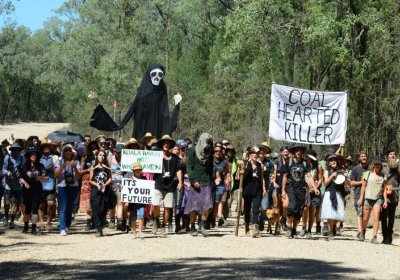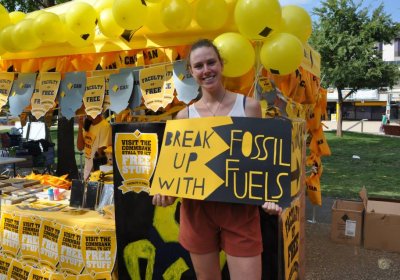The tiny community of Bulga will continue their David and Goliath fight in the courts against a coalmine that threatens the very existence of their village.
The decision to go back to court comes in the wake of the March 5 approval by the Planning and Assessment Commission (PAC) for the expansion of Rio Tinto’s giant Mount Thorley-Warkworth coalmine, despite two court decisions against the project.
Climate crisis
Blink and you might have missed it, but February 27 was the “Great Debate” between Luke Foley and Mike Baird.
The media reported that Premier Baird handed Labor’s Foley his election slogan, because Baird has no plan B for infrastructure without the electricity sell-off to fund $20 billion in projects.
Venezuela has launched a campaign against the environmental toll of hydraulic fracturing in the United States with a new exhibition entitled “Fucking Fracking”.
Government official Ernesto Villegas announced the inauguration of the exhibition on March 2. It will veature talks by economists and oil experts, as well as an anti-fracking play.
The exhibition's logo is a fractured heart dripping with black oil, with dried up leaves coming from the arteries.
US President Obama vetoed a Republican bill approving the Keystone XL oil pipeline on February 24. Both houses of the Republican-dominated US Congress had passed a bill that approved building the highly controversial pipeline designed to bring crude from Alberta's tar sands in Canada to refineries in the US South.
The huge multinational US oil corporation Texaco operated in Ecuador from 1964 until 1992 (Texaco merged with Chevron in 2001).
The corporation poured 72 billion litres of oil waste and 45 million litres of crude oil over 2 million hectares of land in Santa Elena province — land which included the Amazon rainforest, rivers and agricultural land.
Texaco just poured the oil into ground-connected pipes which just poured oil directly into the rivers and forests.
When unionised oil workers at the Tesoro Golden Eagle plant in Martinez, California walked off the job on February 1 to demand safer working conditions, they received some unexpected company on the picket line.
Since the start of the strike, which has expanded from nine to 11 refineries nationwide, environmental activists with Communities for a Better Environment have joined members of the United Steelworkers (USW) union for their daily protests outside the plant.
The devastating effects of the coal industry on public health in the NSW Hunter Valley were highlighted in a public forum at Glebe Town Hall on February 23.
The largest US refinery workers strike since 1980 entered its third week, TeleSUR English said on February 18, with union and oil company representatives set to renew face-to-face talks over pay and safety after a week-long hiatus.
The article said: “The United Steelworkers Union (USW) is seeking a three-year, industry-wide pact that would protect 30,000 workers at 63 U.S. refineries, covering up to two-thirds of the country's domestic oil producing capacity.
Hundreds of people started a week-long walk through Sydney’s western suburbs on February 21 to highlight the risk coal seam gas poses to drinking water.
Beginning at Cataract Dam the route will continue for 160 kilometres through Camden, Campbelltown, Liverpool, Fairfield, Prospect, Parramatta, Auburn, Ryde and Gladesville before finishing at Parliament House in Sydney.
More than 10 community groups came together to organise the walk, including the Western Sydney Environment Network, Stop CSG Macarthur, Parramatta Climate Action Network and the Nature Conservation Council of NSW.
About 250 people gathered at the Leard State Forest in northern NSW from February 13 and 18 to stop Whitehaven Coal clearing the forest to make way for its proposed Maules Creek coalmine.
In the lead-up to the first global divestment day on February 14, the University of Sydney announced it will reduce the carbon footprint of its investments by 20% within three years by divesting from heavy polluters.
But it has shied away from divesting from fossil fuels altogether.
The decision follows a sustained student-led campaign, with support from Greenpeace, that has been urging the university to completely divest its investments in fossil fuels.
Biologists consider the health of frogs to be indicative of the health of the biosphere as a whole.
Frogs have permeable skin that easily absorbs toxins. They require specific aquatic and terrestrial environments to survive and breed, making them highly susceptible to environmental disturbances. Because of this they are considered accurate indicators of environmental stress.
Frogs have lived on the Earth for 250 million years, surviving ice ages and other climate changes. Yet around the world, populations of amphibians, particularly frogs, are now in drastic decline.
- Previous page
- Page 140
- Next page









